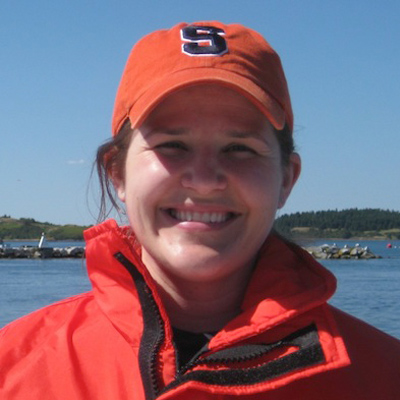Making sense of marine mammal communication for future preservation of endangered species
Oceanographic research is similar to space exploration, except that we know less about our oceans than we do about the moon! Despite our dependence upon the ocean for food and recreation, what lies below its turbulent surface is in many ways a mystery to science. Dr. Susan Parks, Assistant Professor of Biology at Syracuse University, studies marine mammal communication. Specifically, her research is focused on communication in large whales,and especially in humpback and right whales, on the east coast of the US. Drawn to marine mammal research because of the challenges in obtaining data in addition to the majesty of the creatures she studies, Dr. Parks helps to answer fundamental questions about the evolution of communication systems. Furthermore, her research is helping to address the degree to which human generated noise is affecting the animals below the ocean’s surface.
Recent advancement in technology continues to open new horizons in Dr. Parks’ research. Autonomous aerial and underwater vehicles are making it feasible to obtain high quality video images of marine mammals both from the air and underwater. This is rapidly increasing the quality of questions that can be answered within the field. In fact, her research has been highlighted for its innovation in breaking down the barriers of marine science by monitoring acoustics in addition to endangered species off the East Coast. Additionally, her leadership spans beyond the walls of her laboratory and field work as she is currently the Chair of the North Atlantic Right Whale Consortium, which helps study and conserve North Atlantic Right Whales. Furthermore, she is a member of a wide range of scientific societies from the Acoustical Society of America, Society for Marine Mammalogy, and currently is serving as the chair of the right whale consortium. Therefore, through research, advocacy, and the educating of future scientists, Dr. Parks is advancing our understanding of marine mammals while helping us learn how to preserve their future.
Current research includes:
-
Acoustic Ecology of Marine Mammals: Humans navigate their world using visual cues as well as touch and sound. However, under the sea, where it is challenging for light to penetrate, vision is nearly impossible. Therefore, marine mammals have become extremely acoustically focused. Dr. Parks and her team study marine mammal communication to answer a variety of questions including:
-
What Species Makes a Particular Sound? While scientists have made progress in differentiating between the sounds that different animals make, there are still many sounds that have been recorded that are of unknown origin. Dr. Parks uses sophisticated digital technology that attaches to individual whales using suction cups to record their sounds and match the species with particular noises.
-
What does Sound Communicate? Dr. Parks’ research helps to shed light upon how marine mammals are communicating with different sounds. For instance, she and her team have observed and collected sounds relevant to mating behavior, and mother and calf relationships. Further studies hope to uncover if there is a relationship between the types of sound marine mammals make and other demographic factors like age and gender.
-
- Human Effects on Communication: Early in her graduate school career, Dr. Parks’ advisor sent her into the field to record the sounds of North Atlantic Right Whales. While doing so a large container ship passed by and Dr. Parks noticed the deafening noise made it difficult to hear the whales and wondered whether it interfered with their communication with one another. Because marine mammals are so reliant upon acoustic communication, Dr. Parks has continued to study the impact that human sounds can have on marine mammals including small motor boats all the way to large commercial vessels.
Bio
Dr. Susan Parks was born in the urban city of Houston, Texas. Despite living in the city, some of her earliest memories are filled with communing with the natural world. For instance, as a young child, there was a male mockingbird that lived outside Dr. Parks' bedroom window. She would listen with delight to the many sounds that the bird made and looked forward to seeing it each day. Although she didn’t have pets as a young child, she would find all the frogs, lizards and bugs outdoors and play with them as if they were her own. As she grew older, her passion for marine animals grew through family trips to the beach in Galveston.
Her transition from a passion for animals to an academic career began at twelve years old when her father, an electrical engineer, was collaborating with a marine biologist on a study about whale sounds. Accompanying her father to work, Dr. Parks was able to play on the computer with the sounds recorded underwater and was intrigued. Years later, as an undergraduate, the same marine biologist gave a lecture at the university which Dr. Parks attended. The lecture exposed a world of academics where her passions could become a profession and Dr. Parks has never looked back.
Aside from research, in her free time, Dr. Parks enjoys to be outdoors in nature, hiking, riding horses and spending time with her dogs.
Website: http://parkslab.syr.edu


